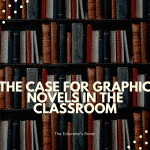As an English teacher, there are few things more contentious than teaching Shakespeare in high school classrooms. The idea that he is outdated, pointless, and just plain boring has plagued many of us. I disagree with all of those things. Because of my positive Shakespeare feelings, I am always looking for new ways to teach his work. Recently, I was fortunate enough to get a copy of Scott Newstok’s How to Think Like Shakespeare: Lessons from a Renaissance Education.
For me, this book was a lot of fun to read. It addresses the way that we think about thinking, and as a teacher, I looked at it type of schooling that produced Shakespeare and his contemporaries (ix).
I had never thought about the positives of education like the one Shakespeare received. One of the main points that I took away from my reading is simple. It was that “education isn’t merely accumulating data,” but that it must be about thinking. Newstok reminded me, however, that although the system of education seemed “unyielding,” that many of the men trained in this way “went on to generate world-shifting insights… an apparently inflexible program of study induced liberated thinking.” To me, this says that it is all about the foundation. If we prepare our students and give them a foundation in a variety of topics, they will be more willing to take on the world someday, in whatever way they want. Another part of this is allowing the students to wrestle with the writings of the greats, like Shakespeare (xi).
A Brief Aside on Teaching Shakespeare
I am sorry, but this is a hill I might be willing to die on. Creating or popularizing around 1,700 words is one thing, but the stories and characters that Shakespeare created are ingrained into our culture. Many authors allude to the Bard in their works. Knowing about Shakespeare and his works is important for our students. As to the claim that being taught Shakespeare is boring, well, these folks have never been in my classroom during Shakespeare Month.
I think that Shakespeare is the model here because there is so much to wrestle with. For my students, Shakespeare is full of new vocabulary, complex characters, rich dialogue, and complex but relatable themes. There is a lot here that can be used to teach our students that foundation that they need. It can also showing them how to read deeper and more critically.
The Book’s Format
As is proper in a book about thinking, this book did not straight out tell me anything. It was framed as a person’s musings on the state of education, and how it could be improved. How do we think about thinking, and why do we approach it in that way? There are fourteen chapters, Of Thinking, Of Ends, Of Craft, Of Fit, Of Place, Of Attention, Of Technology, Of Imitation, Of Exercises, Of Conversation, Of Stock, Of Constraint, Of Making, and Of Freedom. Each used quotes from Shakespeare and other classics to further drive home the points being made.
Each chapter is fairly short, and the book itself is less than 200 pages. This makes it easy to digest, and the style of writing is fairly easy to follow as well. It reads like a conversation (if you annotate your book) with a very well-read friend who is sharing some ideas with you. Personally, I enjoyed this, but I know it is not for everyone.
Some Highlights from How to Think Like Shakespeare
One of the notes that I made in the first chapters is that thought is a craft. Newstok comes back to this concept several times throughout the book. Later on, he discusses how high stakes testing have taken reading “to a soulless dissection of the content without context,” (10). Newstok goes on to list the impacts that high stakes testing has on math. These reduce math and literature from a craft to a series of boxes that must be checked off. All trades start as skills or art, and why should learning be any different?
This is also related to another note I made, that our students are still wearing their thinking training wheels. This particular idea, that we are training students to think without feeding them information also comes back in later chapters. The focus, Newstok says in chapter two, should be on our goal, but we should aim beyond the target. If our students aim at the test, that’s the mark that they will hit, and that’s where they might stop. We still have the target, and we still try to hit it, but that is not the end of our practice. Basically, we can’t treat those standardized tests like the be all end all.
There were many more things in the book to digest and discuss, and many threads woven throughout the pages. These two things, however, were the ones that spoke to me most clearly. Both concepts have already influenced my teaching this year, particularly the idea that my students are learning a craft from me. They may work it differently than I do, but they will learn the basics from me. I like that idea. I would love to know what if you read How to Think Like Shakespeare resonated with you the most?
Final Thoughts
I have always enjoyed teaching my students about critical thinking and how to do it, and this book gave me some ideas about how to do that. In this current climate, teaching is draining. It was reassuring to remember that I’m not just teaching to hit a target of standardized tests but to give my students the skills they need to become lifelong learners and thinkers. They are students of the craft of thinking. This may be things that all teachers know at heart, but it was reassuring to hear it and be reminded of it. If you are looking for a book to make you think, I would highly recommend Scott Newstok’s How to Think Like Shakespeare: Lessons from A Renaissance Education






